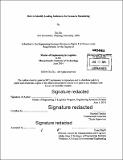How to Identify leading indicators for scenario monitoring
Author(s)
Xu, Xia, M. Eng. Massachusetts Institute of Technology
DownloadFull printable version (6.887Mb)
Other Contributors
Massachusetts Institute of Technology. Engineering Systems Division.
Advisor
Shardul Phadnis.
Terms of use
Metadata
Show full item recordAbstract
Being able to quickly adapt to changes in the business environment has been widely acknowledged as essential for sustainable success by business leaders. Scenario planning is recognized as an effective tool used to explore ambiguous business environment dynamics over a long time horizon and identifying ways to translate uncertainty into potential future strategies. After the potential scenarios are developed and formulated into business strategies, the practical decision-making process then requires continuous review. Existing literature suggests that companies must actively monitor the business environment using appropriate indicators and understand their implications. This research specifically aims to develop a systematic, quantitative approach to identifying potential leading indicators for scenario monitoring. This approach is a framework that calculates correlation between various datasets from public databases, identifying, screening then consolidating the key driving forces of particular business scenarios. This process, in concert with a thorough qualitative assessment by business leader practitioners, enables an effective practice of scenario planning that allows the business to adapt its strategic long term plans in a constantly shifting global environment.
Description
Thesis: M. Eng. in Logistics, Massachusetts Institute of Technology, Engineering Systems Division, 2014. Cataloged from PDF version of thesis. Includes bibliographical references (page 57).
Date issued
2014Department
Massachusetts Institute of Technology. Engineering Systems DivisionPublisher
Massachusetts Institute of Technology
Keywords
Engineering Systems Division.